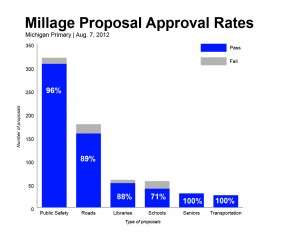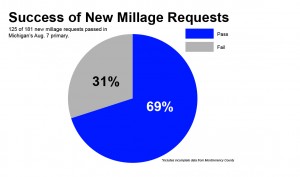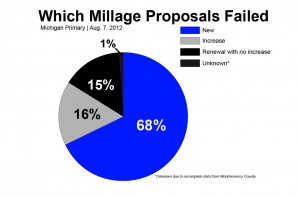Voters sign off on 90 percent of millage requests
Voters across Michigan are familiar with the routine ends of property tax millage requests – road repairs, libraries, schools.
But millages manage mosquitoes, too.
Sims Township, in Arenac County across Saginaw Bay from the Thumb, was one of hundreds of municipalities that requested a millage renewal for public services in last week’s primary. In Sims’ case, the target of the dollars was the ongoing war against the persistent pests in the wetlands by Lake Huron.
“(The mosquito millage) is well-received by the residents,” said Rod Francis, the township supervisor. “It’s very possible there would be a revolt without it.”
BRIDGE DATABASE: Search for millage results in your county
Beyond Sims and their mosquitoes, millage requests were well-received across the state this summer. Out of the 805 millages Bridge Magazine analyzed in Michigan’s 83 counties, 724 passed -- a 90 percent success rate.
“While individual millage requests may or may not have close votes, the very high rate of passage overall is remarkable,” said Tom Ivacko, administrator and program manager with the Center for Local, State and Urban Policy at the University of Michigan via email.
Ivacko said the results show people trust their immediate form of government more than the state or federal varieties.
“People are more trusting if (government) is tangible, they can see it at work,” said Summer Minnick, director of policy initiatives and federal affairs with the Michigan Municipal League.
Bridge’s millage results come from analyzing mostly unofficial elections results from county clerk websites and local media.
While most millage requests were renewals, 181 were new requests. Of those, 125 126 passed, or 69 70 percent. However, new taxes or tax increases heavily populated the ranks of those measures that failed. Of the 82 81 failed millages across the state, 68 percent were for a new tax and 16 percent asked for an increase with a renewal.
Most requests came from townships. Townships don’t receive as much state revenue as counties and cities, relying mainly on property taxes for funding, said Bill Anderson, legislative liaison for the Michigan Townships Association via email.
Michigan municipalities have lost $5 billion in revenue sharing from the state the past 10 years, MML's Minnick said. And with property values down in recent years, communities have sought to raise their own tax rates to compensate.
“Citizens are concerned about the potential for a downward spiral in their communities and believe that local millage requests may be the last line of defense to prevent further disinvestment,” Ivacko noted.
Voter support was high for police, fire protection, emergency services and road measures. Public safety millages were approved at a 96 percent rate. Road millages passed 89 percent of the time.
Fire department millages made up a bulk of public safety requests. MTA’s Anderson noted that most townships employ part-time firefighters funded only by property taxes.
“If the reduced property tax revenues mean a department can no longer afford to replace the essential equipment needed to protect the volunteers and extinguish the fire, the community steps forward,” he said.
Libraries, schools, public transportation authorities and seniors commissions also came asking for money in August.
Of the 59 library proposals, 52 passed, or 88 percent. All 26 public transportation-related proposals passed.
Senior-related proposals, most of them countywide requests, were 100 percent successful. All 30 passed.
School millages weren’t as successful as the other major categories, but 71 percent of the 56 requests did pass. Some of those requests consisted of one school district asking for money in multiple counties.
“Schools have to be very careful and thoughtful about how much they ask for, the timing of the ask and to truly understand voter sentiment,” said Jennifer Rogers, spokesperson for the Michigan Association of School Boards via email.
She noted many districts take multiple attempts to pass a millage. Lakeville Community Schools, asking for money from Lapeer and Genesee counties, passed a proposal on its fourth try for building improvements.
Of the 81 failed millages, 20 percent were school requests.
Experts said voters are more likely to approve requests spelling out specific purposes. However, voters also approved most “general operations” requests, as 40 of 47 passed, or 85 percent.
Francis noted Sims Township residents also agreed to renew a gypsy moth millage -- which is only to be collected if an outbreak occurs. It’s been 10 years since the insects infested the township’s trees. (Statewide, all four mosquito millages were approved, as were all four millages dealing with gypsy moths.)
“The residents of the township value services, they wouldn’t want to be without them,” he said.
Jacob Kanclerz is a recent journalism graduate of Michigan State University. He has worked for the Capital News Service in Lansing.
See what new members are saying about why they donated to Bridge Michigan:
- “In order for this information to be accurate and unbiased it must be underwritten by its readers, not by special interests.” - Larry S.
- “Not many other media sources report on the topics Bridge does.” - Susan B.
- “Your journalism is outstanding and rare these days.” - Mark S.
If you want to ensure the future of nonpartisan, nonprofit Michigan journalism, please become a member today. You, too, will be asked why you donated and maybe we'll feature your quote next time!




